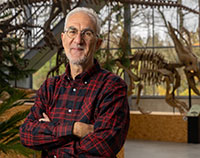 René H.B. Fraaije, Oertijdmuseum, Bosscheweg 80, 5283 WB Boxtel, the Netherlands. directie@oertijdmuseum.nl (corresponding author)
René H.B. Fraaije, Oertijdmuseum, Bosscheweg 80, 5283 WB Boxtel, the Netherlands. directie@oertijdmuseum.nl (corresponding author)
René Fraaije found his first fossil at the age of 11. Graduated in Earth Sciences at the University of Utrecht in 1986. Received his PhD in 1996 on the evolution and ecology of Meso- and Cenozoic crustaceans. In 1983 he set up a foundation to start a new geological museum: the Oertijdmuseum in Boxtel, The Netherlands. To realize this, he organized numerous geological holidays and fieldworks in Europe from 1986 to 2000. From 1986 to the present, he is director of the Oertijdmuseum and author of many studies on fossil decapod crustaceans and other topics.
![]()
 Barry W.M. van Bakel, Oertijdmuseum, Bosscheweg 80, 5283 WB Boxtel, the Netherlands, and Department of Earth Sciences, Faculty of Geosciences, Utrecht University, Budapestlaan, 4, 3584 CD Utrecht, The Netherlands. b.w.m.vanbakel@uu.nl
Barry W.M. van Bakel, Oertijdmuseum, Bosscheweg 80, 5283 WB Boxtel, the Netherlands, and Department of Earth Sciences, Faculty of Geosciences, Utrecht University, Budapestlaan, 4, 3584 CD Utrecht, The Netherlands. b.w.m.vanbakel@uu.nl
Barry van Bakel, palaeontologist and carcinologist with a track record of over 25 years, studies fossil crabs with the emphasis on primitive forms (Podotremata). He is associated researcher at the Oertijdmuseum (Boxtel, the Netherlands) and current PhD student at Utrecht University. Comparative morphology with extant congeners, palaeoecology and macroevolution are typical subjects of his ongoing work.
![]()
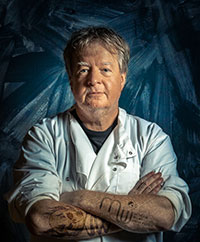 John W.M. Jagt, Natuurhistorisch Museum Maastricht, De Bosquetplein 6-7, 6211 KJ Maastricht, the Netherlands. john.jagt@maastricht.nl
John W.M. Jagt, Natuurhistorisch Museum Maastricht, De Bosquetplein 6-7, 6211 KJ Maastricht, the Netherlands. john.jagt@maastricht.nl
Having been curator of palaeontology (Cretaceous collections) at the Maastricht Museum of Natural History since January 1991, John W.M. Jagt (1960) received his PhD degree at the Vrije Universiteit Amsterdam in May 2000. He specialises in invertebrates, mostly echinoderms, decapod crustaceans, molluscs and ichnofossils from the wider vicinity of the type area of the Maastrichtian Stage (Late Cretaceous). John has named more than 250 new taxa over recent years and (co-)authored around 400 papers in peer-reviewed journals.
![]()
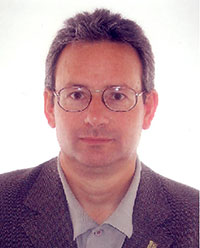 Michał Krobicki. AGH University of Science and Technology, Mickiewicza 30, 30-059 Kraków, Poland. krobicki@agh.edu.pl
Michał Krobicki. AGH University of Science and Technology, Mickiewicza 30, 30-059 Kraków, Poland. krobicki@agh.edu.pl
Michał Krobicki published more than one hundred fifty scientific papers on: stratigraphy, palaeontology (including crustaceans), regional geology, palaeogeography, plate tectonics, palaeoceanography, palaeoclimatology. His main field of interest is focus to history of the Alpine structures from Africa (Morocco – High Atlas) trough European Alps/Carpathians and Himalaya-Karakoram-Tibet realms, especially from Jurassic perspective. He is the leader of the International GeosCience Programme 710 (IGCP 710) under the auspices of UNESCO (2020-2024) untitled: Western Tethys meets Eastern Tethys, and member of several others IGCP projects.
![]()
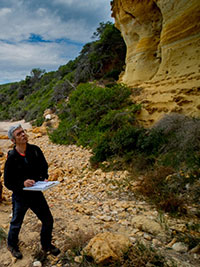 Àlex Ossó. Llorenç de Villalonga, 17B, 1-1, 43007 Tarragona, Catalonia, Spain. aosso@tinet.cat
Àlex Ossó. Llorenç de Villalonga, 17B, 1-1, 43007 Tarragona, Catalonia, Spain. aosso@tinet.cat
Àlex Ossó, from Tarragona (Catalonia), retired (68 years old), passionate from kid with fossils, recovered a large regional fossil collection that donated to the Museu d’Història de Tarragona, which is currently ready for study. As independent researcher, the last decade he focused on fossil crabs from around the world, describing and publishing an array of new taxa comprising from new species to superfamilies. Origins and palaeobiogeography of brachyuran decapods are his main goal.
![]()
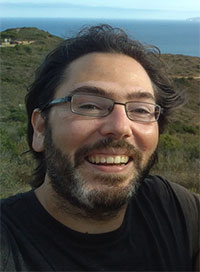 Ferran Palero, Institut Cavanilles de Biodiversitat i Biologia Evolutiva (ICBIBE), Carrer del Catedrátic José Beltrán Martinez, 2, 46980 Paterna, Valencia. Ferran.Palero@uv.es
Ferran Palero, Institut Cavanilles de Biodiversitat i Biologia Evolutiva (ICBIBE), Carrer del Catedrátic José Beltrán Martinez, 2, 46980 Paterna, Valencia. Ferran.Palero@uv.es
Ferran Palero holds a PhD in Biology (University of Barcelona, 2008) and a Master's Degree in Mathematical Research (UPV, 2009). He has carried out postdoctoral stays in Austria (Institute of Science and Technology, 2009-2011), France (National Institute of Agronomic Research, 2012-2014), Blanes (Center for Advanced Studies of Blanes, 2014-2016) and Poland (University of Lodz, 2017-2019). He is currently developing his research project BIOPACKS as a "CIDEGENT Researcher” at the Cavanilles Institute of Biodiversity and Evolutionary Biology (ICBIBE, University of Valencia). The BIOPACKS project (BIOdiversity Patterns of Crustacea from Karstic Systems) focuses on the study of underground aquatic fauna incorporating new molecular methods to discover adaptations of the stygofauna and new enzymes with potential biotechnological application.
![]()
 Jonathan J.W. Wallaard, Oertijdmuseum, Bosscheweg 80, 5283 WB Boxtel, the Netherlands. curator@oertijdmuseum.nl
Jonathan J.W. Wallaard, Oertijdmuseum, Bosscheweg 80, 5283 WB Boxtel, the Netherlands. curator@oertijdmuseum.nl
Jonathan Wallaard has been working as a curator at the Oertijdmuseum since 2018, when he completed his master's degree at Utrecht University. He runs the preparatory facilities, supervises students from various universities and conducts research with a focus on Miocene decapods.

